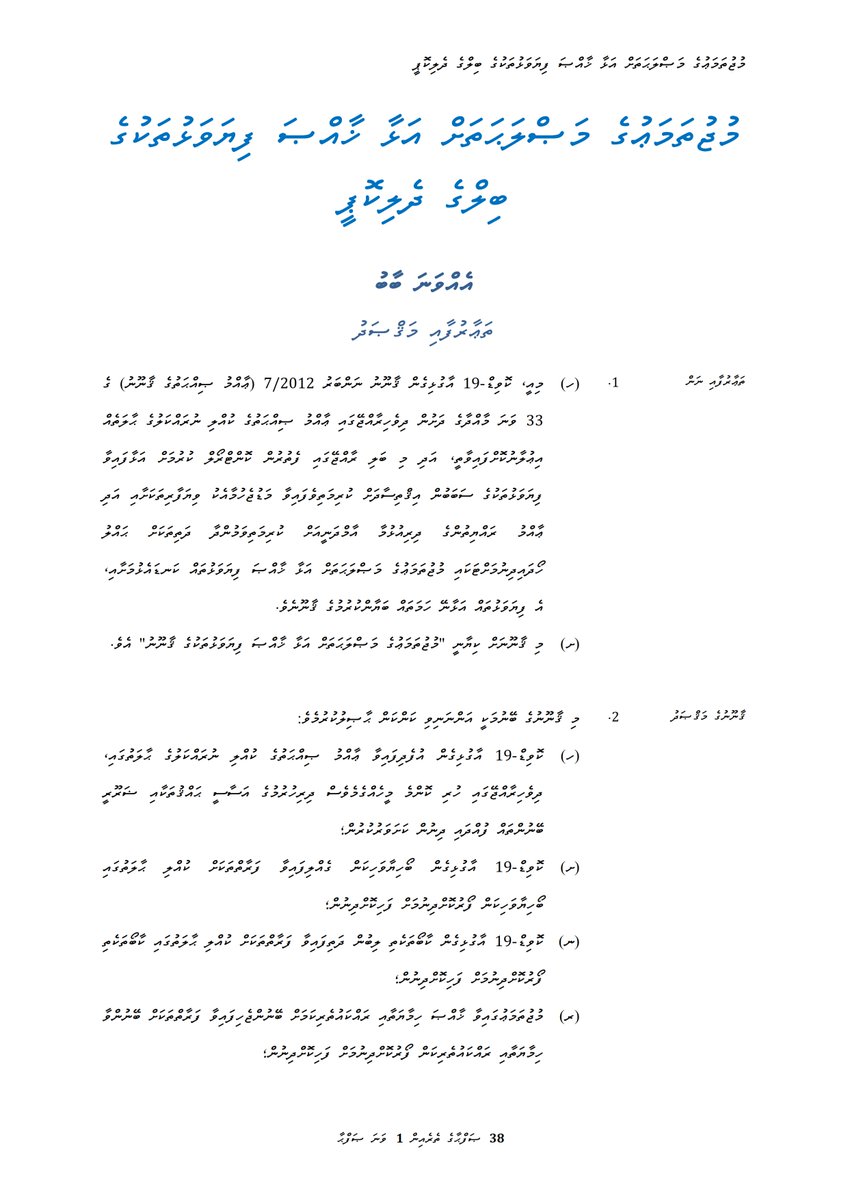For those who don't want to wade through 38 pages of "legalese" (um, so, basically everyone 🙂), the (relatively) short version follows...

- shelter
- food
- rent increases
- evictions
- rent relief
- profiteering
- employment
- unemployment benefits
- mental well-being
- public utilities & internet charges
- loan relief
- State expenses
- wages of higher-earning State officials
Some measures will be activated by a 𝗦𝗽𝗲𝗰𝗶𝗮𝗹 𝗠𝗲𝗮𝘀𝘂𝗿𝗲𝘀 𝗗𝗲𝗰𝗿𝗲𝗲 of the President.
- 31 𝗗𝗲𝗰𝗲𝗺𝗯𝗲𝗿 2020, or the lifting of
- the current State of Public Health Emergency or
- any State of Emergency declared under the Constitution to help control the pandemic.
- homeless or starving
- infected or at high risk of being infected
- single parents
- persons with special needs
- guardians of minors
- health professionals
- emergency service providers
- anyone unable to return to their usual place of residence due to COVID-19
- migrant workers abandoned by their employers
The following acts will be prohibited during the Special Protection Period:
- increasing rent
- terminating rent agreements
- evictions
- obstructing provision of public utilities
- hindering tenants' access to premises
- any act intended to force tenants to vacate
Tenants do not need to request for the relief to be granted; it is the responsibility of the landlord to ensure the relief is provided.
To qualify, rent reductions must be not less than 20% of the rent & the reduced amount must not be payable at a later date.
Rent waivers must be of the entire month's rent for however many months.
- 20% waived
- 30% deferred for not less than 1 year
This adjustment covers instalment payments for "Social Housing" projects.
- 30% waived
- 40% deferred for not less than 1 year
𝗧𝗮𝘅 𝗰𝗿𝗲𝗱𝗶𝘁𝘀 for rent reductions range from 15 - 50%
For waivers, the rate is 25 - 75%
All costs of housing migrant workers in Emergency Shelters must be borne by the respective employers of those workers.
No fees are payable by the govt for such use of resorts, but an appropriate amount (as decided by the President) may be deducted from future head lease payments.
The State must establish 𝗘𝗺𝗲𝗿𝗴𝗲𝗻𝗰𝘆 𝗙𝗼𝗼𝗱 𝗗𝗶𝘀𝘁𝗿𝗶𝗯𝘂𝘁𝗶𝗼𝗻 𝗖𝗲𝗻𝘁𝗿𝗲𝘀 in every inhabited island, in association with local councils, CSOs, volunteers & businesses.
Any party assisting in providing food from such Centres is entitled to tax credits.
Where the govt believes the price has been set to take undue advantage of the public's situation, then it may control the price of such food, goods or services.
All surrendered profits will go to a 𝗡𝗮𝘁𝗶𝗼𝗻𝗮𝗹 𝗙𝘂𝗻𝗱 𝗳𝗼𝗿 𝗖𝗼𝗺𝗺𝘂𝗻𝗶𝘁𝘆 𝗥𝗲𝗰𝗼𝘃𝗲𝗿𝘆.
Effective from 1 March 2020 & including anyone who was an employee on 29 Feb 2020, all unilateral decisions by employers to reduce employees' wages, withhold Ramazan benefits, or subject them to unpaid leave or temporary lay-offs or redundancy are annulled.
All payments made by the State are reimbursable by the employer. In making this reimbursement, employers may not make deductions from the employee's wages.
For this special audit, those employers must submit to the Auditor General within 7 days 𝗮𝗹𝗹 𝘁𝗵𝗲𝗶𝗿 𝗳𝗶𝗻𝗮𝗻𝗰𝗶𝗮𝗹 𝗿𝗲𝗰𝗼𝗿𝗱𝘀 for the past 5 years.
In addition to imposing penalties under the Employment Act, the Employment Tribunal is to award 2 months' wages as compensation to the employee.
Where any employee has not been paid Ramazan benefits, the govt is to pay those benefits before the end of Ramazan. The benefits paid by the govt are to be reimbursed to the govt by the respective employers.
There is no hindrance to the imposition during this period of disciplinary measures under the Employment Act.
- self-employed persons and freelancers, based on their average monthly income between 1 December 2019 & 29 February 2020
- unemployed persons
Such benefits paid by the State are 𝗻𝗼𝘁 𝘁𝗼 𝗯𝗲 𝗰𝗼𝗻𝘀𝗶𝗱𝗲𝗿𝗲𝗱 𝗹𝗼𝗮𝗻𝘀 in any way.
Each employee is entitled to paid leave of up to 2 days per month as 𝗺𝗲𝗻𝘁𝗮𝗹 𝘄𝗲𝗹𝗹-𝗯𝗲𝗶𝗻𝗴 𝗿𝗲𝘃𝗶𝘃𝗮𝗹 𝗹𝗲𝗮𝘃𝗲.
No adverse impact is permitted on the career of any employee who takes such leave.
- infected or admitted for treatment
- requested to self-isolate by health authorities or
- residing in a place under monitoring status
- quarantined
During the Special Protection Period, charges for public utilities & internet & phone services must be reduced by between 25 – 40%, as decided by the govt.
The following is also prohibited:
- increase in fees
- changes to usage calculation
- repayments of certain types of loans to be suspended
- no interest to accrue
- maximum interest rate permitted shall not exceed 3% p.a
- compound interest prohibited
- enforcement of mortgage agreements to be suspended
Wages of State officials & employees of entities with State shareholding
- under 20k: no deductions
- 20 to 30k: 10%
- 30 to 50k: 25%
- 50k & above: capped at 50k
- refusing service to health professionals & expatriates prohibited
- wages of SOE board members to not exceed Permanent Secretaries' wages
- employers to whose staff the State has paid benefits may not bid for public contracts until they have reimbursed the State
The draft is intended to serve as an aid to reasoned discussion & debate, not to be the final word. I hope it helps.
#StaySafe


